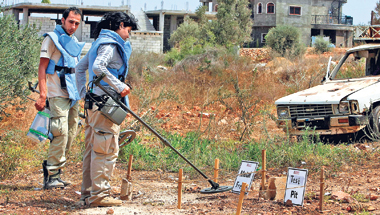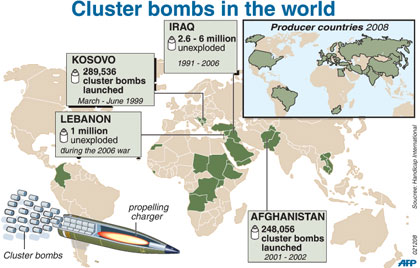NEW YORK - Pat Buchanan, a part-time columnist, a full-time political analyst and a two-time candidate for the Republican presidential nomination, once famously described the United States Congress as "Israeli-occupied territory" because of its overwhelming and unrelenting support for the Jewish state -- right or wrong.
But the real "Israeli-occupied territories" are the West Bank, Gaza Strip, East Jerusalem and the Golan Heights -- all of them annexed after the 1967 Arab-Israeli war. The Lebanese, however, have a different story to tell.
 |
| Demining personnel searching for cluster bombs in a field in the village of Siddiqin in southern Lebanon. AFP |
They have their own "Israeli-occupied territories" -- more than 48 million square metres of land where myriads of cluster bombs were air-dropped by Israel during its four-week-long conflict with the Islamic militant organisation Hezbollah in 2006. With no human habitation possible, these heavily-mined border villages are virtual "Israeli-occupied territories" inside southern Lebanon.
The UN says that "millions" of cluster munitions were dropped in southern Lebanon in July and August 2006, killing and injuring over 300 civilians. And hundreds and thousands of munitions failed to explode on impact and remain on the ground, on rooftops, and in agricultural areas, killing mostly civilians. They are potentially dangerous killing fields with Israeli munitions still in "occupation".
A legally-binding treaty, which prohibits the future use, production, stockpiling and transfer of cluster munitions, was signed last week in the Norwegian capital of Oslo by 104 out of 192 UN member states. However, it will only come into force six months after 30 states ratify it.
But three of the five veto-wielding permanent members of the Security Council -- the US, China and Russia -- skipped the signing ceremony. So did Israel, and Sri Lanka, along with over 75 others. Britain, France, Germany and most of the members of the North Atlantic Treaty Organisation (NATO), however, did sign the treaty. Perhaps the other non-signers may follow suit because the treaty is still open for signature.
Israeli Foreign Ministry spokesman Yigal Palmor was quoted as saying his government had decided not to join the treaty because it believed the deployment of cluster bombs was an issue to be addressed by the UN Convention on Conventional Weapons. "We're not participating because we don't think it can lead to any serious credible results," Palmor said.
William D. Hartung, director of the Arms and Security Initiative at the New York-based New America Foundation, says it is a hopeful sign that President-elect Barack Obama has agreed to reconsider current US policy with an eye towards possibly joining the cluster bomb ban.
And even short of signing on, there is much that the United States can do, from stopping exports, to curbing their use, to spending more to help clean up unexploded "bomblets" that could approach de facto support for the ban, he said.
According to the United Nations, at least 15 countries, and a number of non-state actors, mostly military groups, have used cluster munitions in at least 32 countries or territories. A total of 34 countries have produced more than 200 types of cluster munitions while billions of these are said to be stockpiled in 75 countries.
The UN also points out that cluster munitions, which contain dozens of smaller explosives designed to disperse over an area the size of several football fields, were first used in World War II. But about 15 percent of these munitions fail to detonate upon impact creating huge and deadly minefields.
Over the years, they have claimed more than 10,000 lives, 98 percent of them civilians and 40 percent children, according to the UN.
Among the weapons currently prohibited by UN conventions are chemical and biological weapons and anti-personnel landmines.
Jayantha Dhanapala, a former U.N. Under-Secretary-General for Disarmament Affairs, says the signing of the Convention by over 100 states eliminates an entire category of weapons and "is another major triumph for disarmament achieved through a unique coalition of civil society groups and nation states".
"It is an indictment on the established framework for the negotiation of international disarmament treaties and on the major powers whose obstructionism has failed to stop the powerful groundswell of international public opinion," he added.
"We have more mountains to climb especially with regard to the elimination of nuclear weapons and this victory, which includes victim assistance as an important element, should be an encouragement," added Dhanapala. | 

